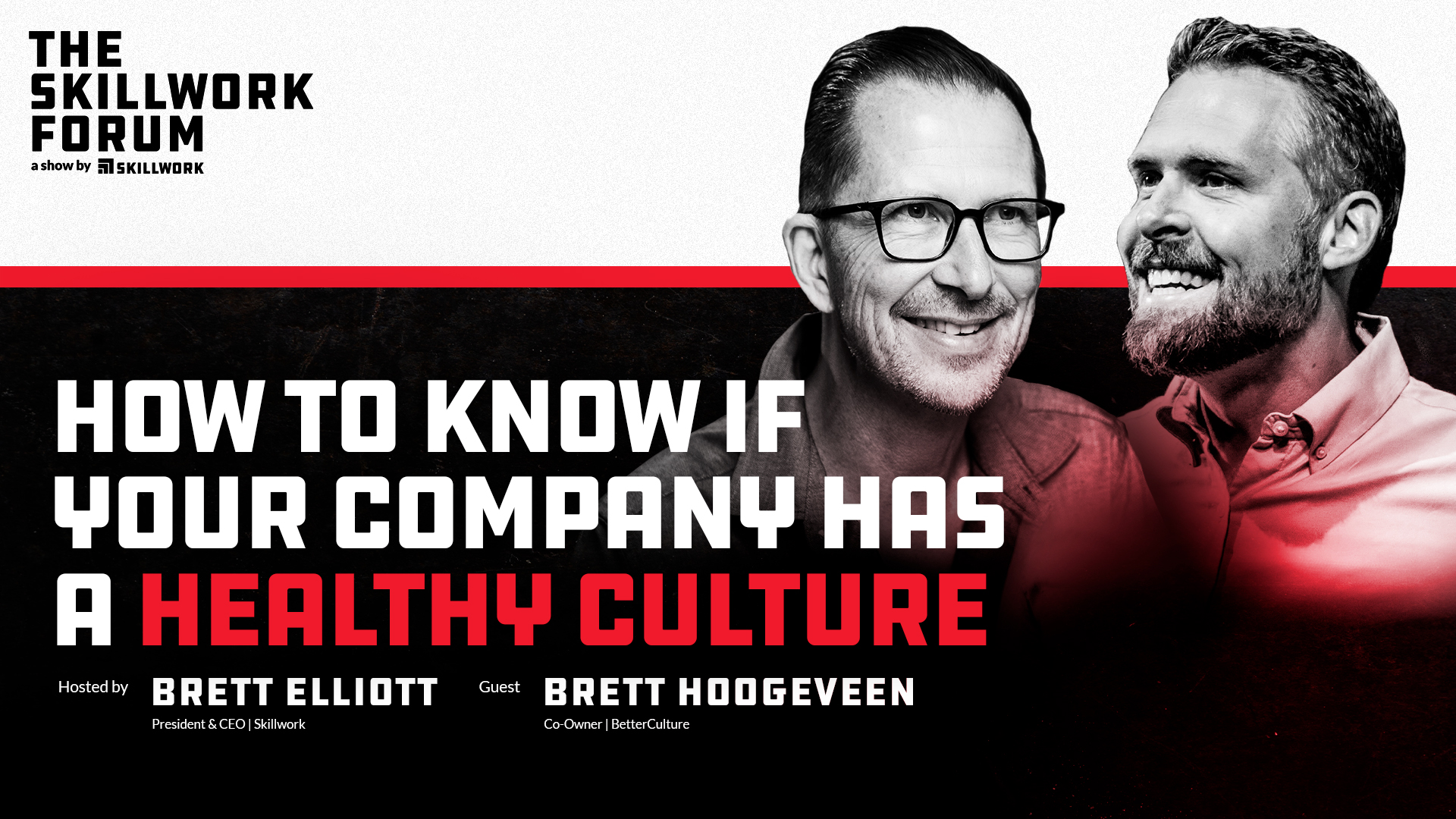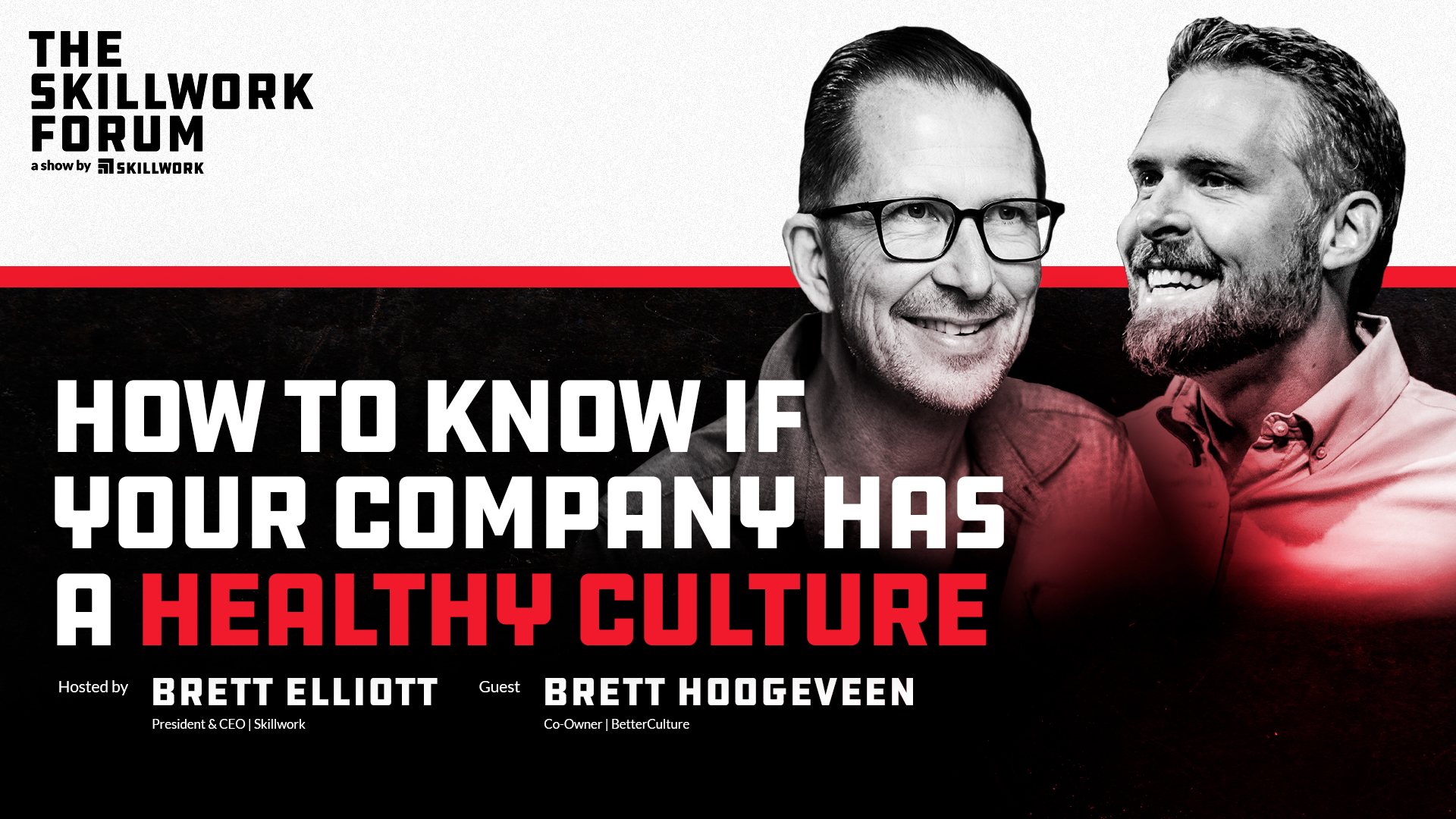Assess, Prioritize and Improve the Health of Your Company’s Culture

One of the most overlooked components of a successful company is a healthy workplace culture.
No organization aims to create a negative workplace environment, but a lack of intentionality to create a healthy company culture can result in unhealthy conditions by default.
The remedy? Communicating and adhering to clear, strong company values.
On this episode of The Skillwork Forum, Brett Elliott (President and CEO of Skillwork) and Brett Hoogeveen (Co-Owner of BetterCulture) get practical when advising business owners to assess, prioritize and improve the health of their workplace culture.
For more information on how you can improve the health of your organization’s culture, check out our latest podcast.
How Important Is Culture in the Workplace?
Today, most employers realize that if they want to attract, motivate, and keep talent, they have to invest in creating the best culture. One of the most powerful ways to focus on doing that is to think about these questions: What's the culture we're putting our employees in every day? And do they love it?
We’ve heard it said that employees are a company’s greatest asset, but do employers really believe that? Does their company culture align with that statement? We’ll discuss later that culture and employee retention go hand-in-hand.
/210505_Skillwork_TSWF_Ep_How%20to%20know%20if%20your%20company%20has%20a%20healthy%20culture%20with%20Brett%20Hoogeveen%20(BetterCulture)_QG1.png?width=1080&name=210505_Skillwork_TSWF_Ep_How%20to%20know%20if%20your%20company%20has%20a%20healthy%20culture%20with%20Brett%20Hoogeveen%20(BetterCulture)_QG1.png)
What Does the Company Better Culture Do?
BetterCulture equips organizations that want to be better places to work and improve their people practices. After realizing that being a very high-touch, in-person, high-cost management consulting practice wasn’t scalable, BetterCulture pivoted–it now offers three primary services:
- Employee Engagement Survey. If you care about your company’s culture and retention, you have to measure it and get an accurate sense of how your employees feel about working for you. BetterCulture offers a survey that helps organizations get a pulse on their employees.
- Leadership Development Initiative Program. Great company culture is built from both the top down and bottom up. For companies that say, “We wish we were developing our leaders,” BetterCulture offers a leadership development program. Companies can internalize the program, then introduce it to their leaders, who will love and benefit from it.
- 20 Tenets of Culture. Lastly, every organization that cares about fostering a great company culture should have strong values that their employees can recite. BetterCulture has created a revolutionary bottom-up culture-shaping product called the 20 Tenets of Culture. Once these 20 elements of workplace culture are shared with employees, the whole company has an opportunity to converse about the values and behaviors that matter to them.
/210505_Skillwork_TSWF_Ep_How%20to%20know%20if%20your%20company%20has%20a%20healthy%20culture%20with%20Brett%20Hoogeveen%20(BetterCulture)_QG2.png?width=1080&name=210505_Skillwork_TSWF_Ep_How%20to%20know%20if%20your%20company%20has%20a%20healthy%20culture%20with%20Brett%20Hoogeveen%20(BetterCulture)_QG2.png) Employee Retention: Importance of Investing in People
Employee Retention: Importance of Investing in People
One of the 14 factors BetterCulture reports on is “employee retention risk.” What's the likelihood that employees are thinking about going to do something else? There are a lot of variables that affect whether somebody is happy in their job and whether they're going to tell you if they're happy in their job. Having said that, a great company culture is the best protection against high turnover and low retention.
Below are two employee retention strategies Brett H. recommends in the podcast as we continue to discuss the question, “How important is culture in the workplace?”
1. Build positive relationships
One way to better manage turnover and retention is to have management build positive relationships with employees. Somewhere between 50% and 70% of how an employee feels about their employer is tied to the relationship they have with their boss. The best cultures are ones where managers help team members develop their skills and grow into new positions, whether at the same company or not.
/210505_Skillwork_TSWF_Ep_How%20to%20know%20if%20your%20company%20has%20a%20healthy%20culture%20with%20Brett%20Hoogeveen%20(BetterCulture)_QG3.png?width=1080&name=210505_Skillwork_TSWF_Ep_How%20to%20know%20if%20your%20company%20has%20a%20healthy%20culture%20with%20Brett%20Hoogeveen%20(BetterCulture)_QG3.png)
People want to feel like their employer cares about their success at work and maybe even outside of it. Are you finding ways to invest in your people? Are you giving them a sense that they’re growing and developing by being a part of your company? Are you communicating to them that they’re not just a job description but a valuable contributor to your organization?
Intentional investments in your people pay off many times over, so don’t overlook those opportunities.
2. Address poor performers
One of the biggest factors that cause people to leave your organization is if the management team doesn't address poor performers. We’re talking about the person who doesn’t pull their weight, that's hard to work with, or that you constantly have to bail out on a team.
If you choose not to address those people, they won’t change. It's not your star performer who you will retain three years from now; it's that underperforming employee who's too comfortable. As Brett H. said, “I know that's tough medicine, but it’s one really, really big piece of advice for organizations that are trying to work on culture and retention.”
/210505_Skillwork_TSWF_Ep_How%20to%20know%20if%20your%20company%20has%20a%20healthy%20culture%20with%20Brett%20Hoogeveen%20(BetterCulture)_QG4.png?width=1080&name=210505_Skillwork_TSWF_Ep_How%20to%20know%20if%20your%20company%20has%20a%20healthy%20culture%20with%20Brett%20Hoogeveen%20(BetterCulture)_QG4.png) Find Skilled Workers, Build Better Organizations
Find Skilled Workers, Build Better Organizations
If you can't find skilled tradespeople due to the labor shortage and need to hire one (or more) ASAP, reach out to our team at Skillwork. As a veteran-owned travel staffing agency specializing in the trades, we value, vet, and connect skilled workers with employment opportunities across the U.S.
If you need help building a better organization and company culture, sign up for a free consultation with BetterCulture. As they ask questions to learn about your distinct challenges and opportunities, BetterCulture will help you identify impactful, next-step options that can be precisely tailored to your specific needs.
Main Takeaways:
| Focusing on retention is the most effective strategy for keeping your best employees.
| The depth of the relationships within your company is reflective of the health of your workplace culture.
| How an employee feels about their workplace is largely tied to how they feel about their boss.
| Taking a passive approach in addressing under-performing employees hurts your company’s retention rate.
Timecodes:
00:00-07:17 | The importance of fostering a healthy workplace culture
07:18-14:58 | How relationships within the workplace reflect a company’s health
14:59-20:03 | How having strong, defined values sets your company up for success
20:04-27:33 | How avoiding hard conversations can hurt you in the long run
Quotes:
“Culture owns talent.” - Brett Hoogeveen, Co-Owner of BetterCulture
"Shallow relationships between an employee and employer are an indication of a culture that could use some improvement.” - Brett Hoogeveen, Co-Owner of BetterCulture
“Even in a big, huge company, somewhere between 50%-70% of how any employee feels about their whole company is tied to the relationship they have with their boss.” - Brett Hoogeveen, Co-Owner of BetterCulture
“The biggest factor that's going to end up causing people to leave your organization is if you, as a management team, don't address your poor performers, your people who are negative, cynical, who don't fit the culture, who are non-performers that don't get their job done.” - Brett Hoogeveen, Co-Owner of BetterCulture
————————————————-
Connect with Skillwork:
-
Skillwork’s website: www.skillwork.com
-
Skillwork’s LinkedIn: www.linkedin.com/company/skillwork
-
Skillwork’s YouTube channel: www.youtube.com/channel/UCWZSf9KTuKudIm2buVFrhcw
Reach out to Rveal:
-
Rveal’s website: rveal.media
-
Rveal’s LinkedIn: https://www.linkedin.com/company/rvealmedia/
-
Rveal’s YouTube channel: https://www.youtube.com/channel/UC69p14R2ccMdyUbbmdlWCEw

